'The Kuzbass is now just one big hole': Siberian coal town residents on their failed effort to come to Canada
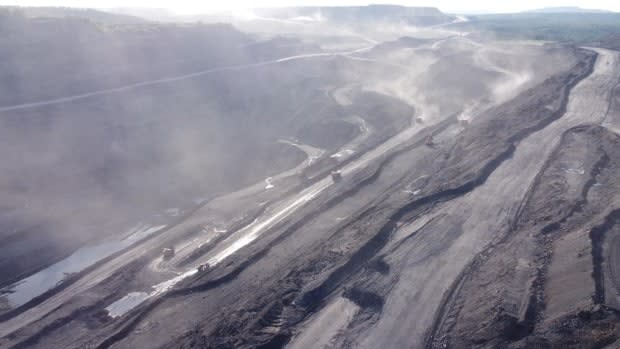
The view from the top of Alps Street, the high point in the Siberian city of Kiselyovsk, makes it seem like surrounding neighbourhoods are being swallowed up by a succession of giant black holes.
Nine open pit coal mines encircle this city of 90,000 people in Russia's Kuzbass region, the epicentre of the country's coal production, 3,700 kilometres east of the capital, Moscow.
Daily, bone-rattling explosions from the pits reverberate across the blackened landscape, shifting buildings off their foundations and leaving structures crumbling.
The spontaneous combustion of coal byproducts dumped in areas adjacent to neighbourhoods engulf homes in noxious fumes.
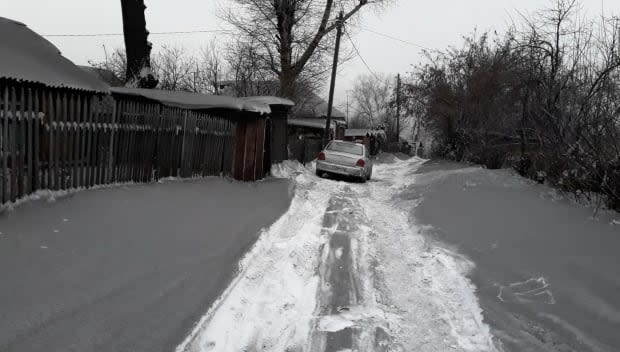
And, depending on the wind, thick black dust can blanket cars and homes.
"I just have to open the window, and there's a layer of soot this thick," said resident Natalia Kamarova, holding her fingers a centimetre apart.
"The children are breathing this. I don't think these homes should be near the pits."
A crew from the CBC's Moscow bureau visited the community on the eve of the summit between President Vladimir Putin and U.S. President Joe Biden to survey the mood and priorities of Russians who live outside the big cities — and because Kiselyovsk has an unusual connection to Canada.
Video asks Trudeau for help
For years, thousands of families have pleaded with local and regional authorities to move them farther away from the encroaching coal mines.
When that advocacy got them nowhere, a small group took things further.
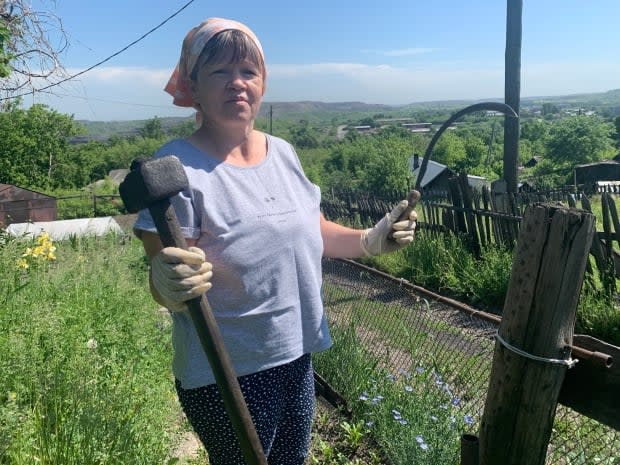
In June 2019, they made an unprecedented plea for outside help — to Canada.
Several dozen residents, who became known locally as the Kiselyovsk Canadians, made a highly publicized video asking Prime Minister Justin Trudeau to admit them to Canada as environmental refugees.
"Unbearable conditions for life have developed in Russia," they said in their appeal, taking turns stepping before the camera and imploring Canada's government to give their families a cleaner future in a place where the snow "is still white."
WATCH | Drone footage shows scale of coal mining near Kiselyovsk:
The polite but disappointing response emailed from Canada's Embassy in Moscow affirmed that Kiselyovsk's conditions are a problem only Russia's government can solve.
If the residents were hoping their plea might either provoke or embarrass local authorities into action, the outcome two years later has been profoundly disappointing and unsettling.
The local governor, Sergey Tsivlev, denounced the group that made the video at a news conference days later, saying they "discredited Russia."
He visited some of the worst-affected neighbourhoods and made what the residents thought were promises to move them. It turned out to be more false hope.
Tsivlev later agreed to host a major mining exhibition in Kiselyovsk in August 2021 as evidence of his government's commitment to the community.
But, on the key issue that sparked the crisis, residents say they have seen little evidence the government is proceeding with plans to move them out of their homes.
Little tolerance for opposition
There have also been allegations of retaliation.
Natalia Zubkova, an environmental activist who helped the residents make the video, was attacked by an unknown assailant on a street not far from her home.
She says her family was threatened and she was pursued by the Russian secret police, the FSB.
First, she fled the city, then the region, and then Russia.
She's now living in exile in Georgia.
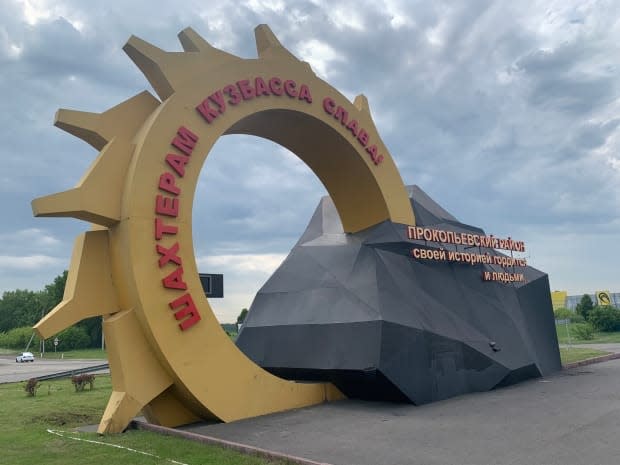
Her situation is symptomatic of a repressive turn by Russian authorities that has led to the arrest of thousands of government opponents already in 2021.
The federal State Duma has also designated the anti-corruption activities of imprisoned opposition figure Alexei Navalny as "extremism" and barred his supporters from running for election.
The only substantive progress Kiselyovsk residents say they can point to is that a smouldering field that would occasionally burst into flames has now been covered in clay.
The area sits at the end of Vitaly Shestyakov's street, where bright orange signs continue to warn people of the ongoing danger of poisonous gases.
"The government ... do not want to help the people," said Shestyakov, a 33-year-old husband and father of two, who was among the group that made the appeal to Canada.
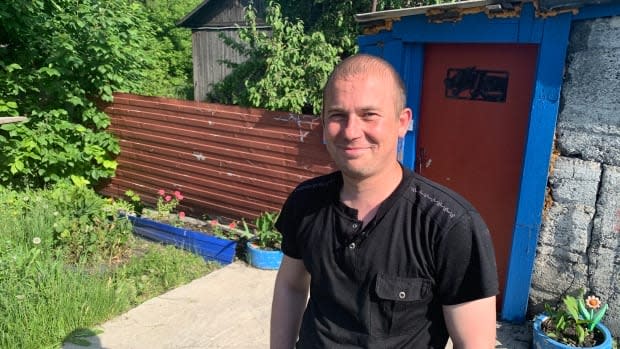
Shestyakov said he was motivated by a near-death experience. Methane fumes from underground fires nearby almost killed his wife and children as they slept, he said.
He said he believes they'd all be dead were it not for the howls of the family cat that woke them up.
"The main thing for [the government] is to take the coal, and that's it," he said in an interview outside his house. "I think the Kuzbass is now just one big hole."
Coal mining production increases
Over the past 20 years, roughly the same period as President Vladimir Putin has ruled the country, Russian coal production has increased by 30 per cent to 440 million tonnes a year.
Driven by export markets in South Korea and other Asian nations, Russia is now the world's third largest coal producer.
The mines in Kiselyovsk, which receive generous subsidies from the federal government, are all owned privately by Russian billionaires who've grown immensely rich from the expansion of mining operations.
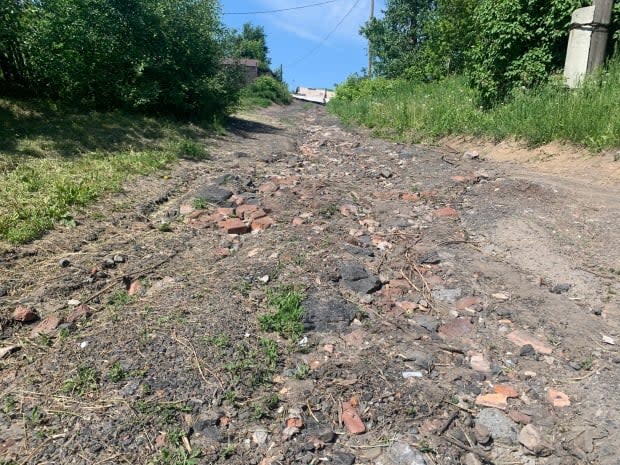
Meanwhile, mine workers who live on the periphery have seen their earnings stagnate and their homes become next to worthless as the open pits encroach on their properties.
While Russian law mandates that mines must be at least 1,000 metres away from residences, CBC News counted hundreds of homes that were well inside that limit.
On a recent visit, residents of Alps Street pleaded with a CBC crew to come inside their homes to see their living conditions.
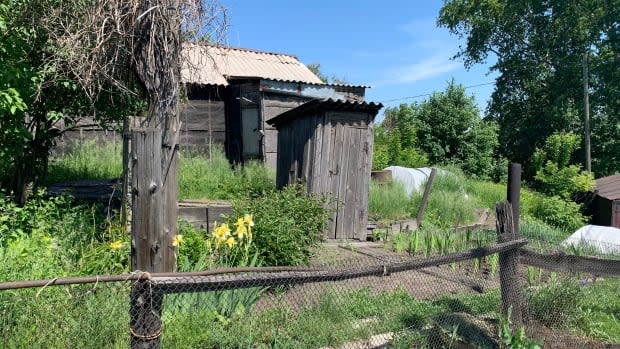
Entire neighbourhoods have no plumbing, sewers or indoor toilets. Even in places where there are pipes, water often isn't available for large parts of the day.
"We've lived here for over 30 years and they have told us forever they will demolish this place," said Lilya Kazakova, standing with her husband, Victor, on their slanted living room floor.
"It used to be upright," she said of her home, "but now it's sideways."
A neighbour, Ludmilla Mizulia, said the dirt road running past her home is deeply rutted with large rocks that often scrape the bottom of cars.
Assigning responsibility
The residents said there's plenty of blame to go around, from the mine owners, who put profits ahead of everything, to corrupt government officials.
And plenty of criticism was directed at Putin and Russia's national government.
Alexander Gartman, 66, a former mine worker and union organizer, brought the CBC crew to a sprawling cemetery on the edge of an enormous coal pit.
He said the death rate in the Kuzbass region is almost twice as high as the birth rate, according to statistics from 2018, and cancer rates are 10 times higher here than in other parts of Russia.
"This is a criminal destruction of the population of Siberia," he said.
"If someone is waiting for something from President Putin or the State Duma, they are wasting their time. Each year, it just gets worse.
"Russia is dying as a country even though it is the biggest in terms of territory. We have oil, gold and silver. We have everything! But the people have basically nothing. It has reached a point of shame."
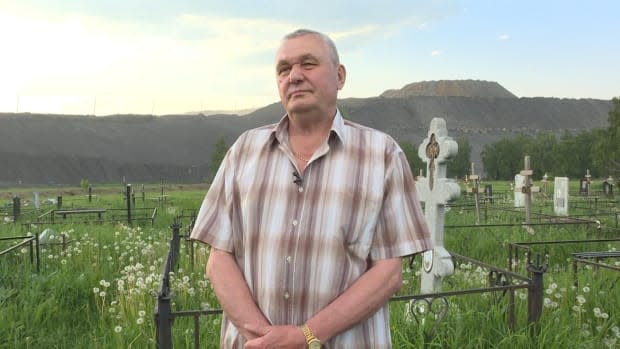
In a series of news releases, local officials have pushed back against accusations they have been slow to respond to the community's concerns.
In February, officials announced that more than $33 million Cdn had been set aside to relocate more than 875 families in Kiselyovsk over the next three years.
In April, the region's deputy governor announced new measures to reduce coal dust and other pollution from the mines would be in place by the end of the year.
And, as part of the Miners' Day celebrations, various levels of government said they will spend one billion rubles ($16 million Cdn) to build a new sports and entertainment complex in the community.
But Gartman says residents have grown deeply cynical about such promises, as they usually turn out to be far less than what was billed.
"It's just PR ... to show that they care about people, but there is nothing there."
WATCH | Kiselyovsk residents explain why they feel abandoned:
In the lead-up to this week's summit between U.S. President Joe Biden and Putin, Russia's TV networks have been blaming the U.S. for many of the country's economic woes, especially for imposing economic sanctions.
TV hosts have also been floating conspiracy theories that the U.S. wants to steal Siberian territory from Russia or is poised to take over Russia's Arctic.
But the people CBC News spoke with in Kiselyovsk said they see Russia's problems as home-grown and not the fault of any external adversary.
"What has United Russia done?" said Victor Kazakov, from Alps Street, referring to Putin's political party. "It should be fixing these problems if it's the ruling party, but they don't come here or anywhere."

